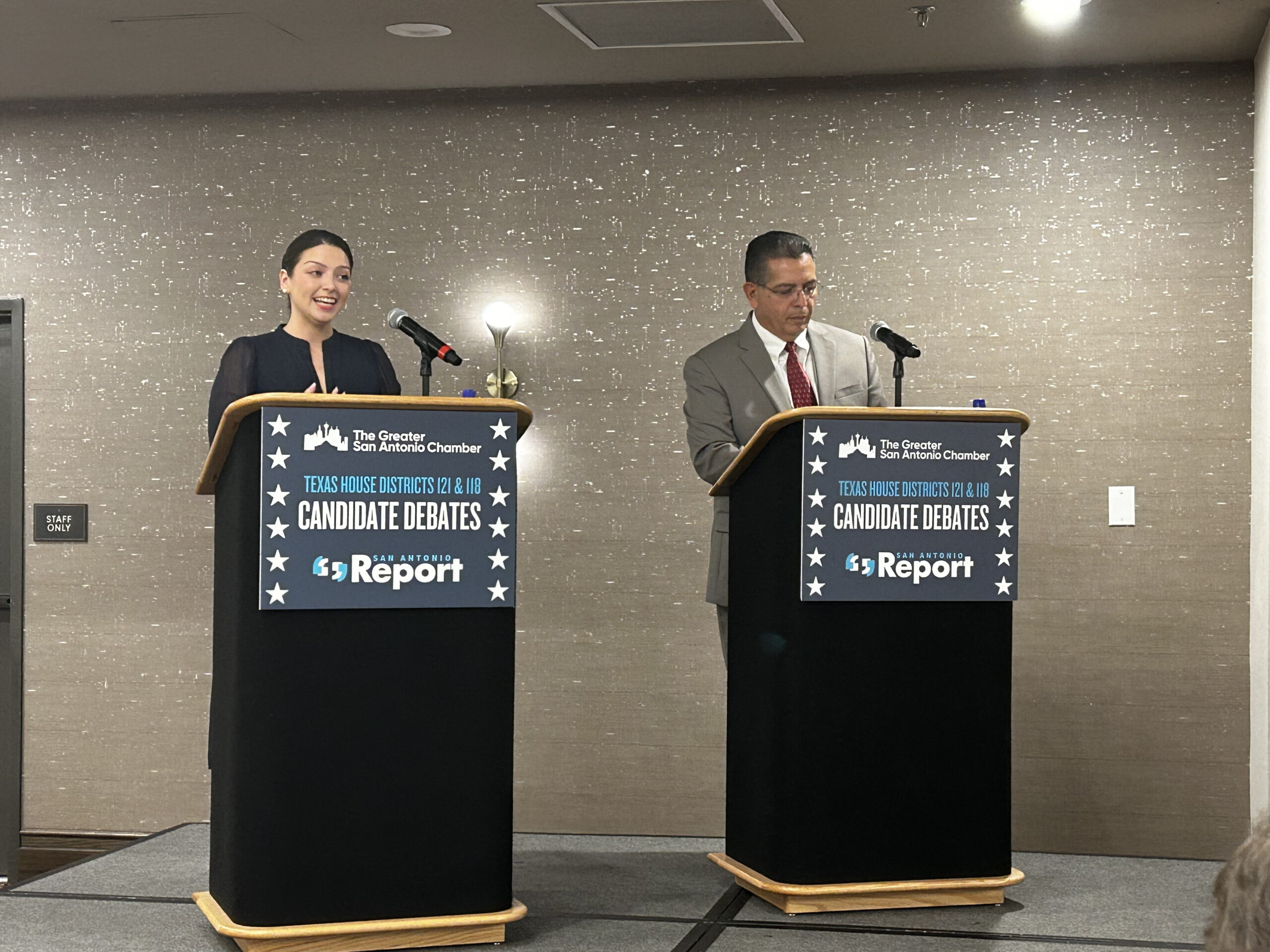As Principal Joaquin Hernandez shows me around the sprawling campus of MacArthur High School in San Antonio’s North East ISD, he greets students by name, hurries them to class, and explains how he’s finding ways to cut costs amid a district-wide $62.5 million budget deficit for this school year.
“I try to keep any real cuts away from our classes,” said Hernandez, who also has two children attending the school. “I’ve tried my best to not let the kids feel it.”
Hernandez points out the gray plastic feet they’ve put on rickety chairs, scarred and stained cafeteria tables to be covered up with tablecloths, benches he’s gathered from hotels closing down. He’s also asked students and parents to pitch in. MacArthur’s culinary program cooks food for some school events. Students host fundraisers for extracurricular activities.
“I think what the kids have felt more than anything is the fact that every program is doing a fundraiser … and they’re like, ‘Dude, we’re doing another one?’”
The parent-teacher group recently chipped in $700 to pay for a fence alongside the school that was needed to meet new school safety requirements that the state mandated but did not provide funding for. Hernandez considers MacArthur’s situation lucky compared to other Texas schools in even more dire financial straits. Still, the high school has eliminated a handful of full-time teaching positions and class sizes have increased from 22 to 27. Hernandez now meets with the bookkeeper every two weeks to continuously assess what else can be cut.
In San Antonio’s communities, the financial crisis in public schools has residents concerned. Diana McKinney, a parent of a recent graduate and a junior at MacArthur told the Texas Observer, “I worry about the future of public education. There’s a great risk given what’s on the agenda of the more conservative groups seeking office. Our state politicians are not supporting public education.”
Almost every single school district in the San Antonio area is facing a funding shortage after the Texas Legislature failed last session to use its $33 billion surplus to alleviate the growing financial crisis public school districts face from inflation, declining enrollment, and property tax cuts that have restricted local revenue.
That crucial state aid became a casualty of Governor Greg Abbott’s political brinkmanship as he tied a $7.6 billion public school funding package to the passage of a failed private school voucher program. But even after a year-long pressure campaign and four grueling special sessions, Abbott’s top priority was still struck down by a coalition of rural Republicans and Democrats in the Texas House. In the months after, Abbott spent tens of millions of dollars on a primary war to replace over a dozen GOP incumbents who defied him with pro-voucher lackeys. After the May runoffs, Abbott declared that the anti-voucher firewall had fallen and he “now has enough votes to pass school choice.”
But the numbers aren’t set in stone yet, and House Democrats are hoping to flip at least three GOP-held seats in November to retain an anti-voucher majority. With local school districts reeling from financial crises and residents dismayed by Republicans’ attacks on public education, the races for two state House districts in San Antonio—one swingy seat repped by an embattled Abbott ally, the other a moderate Republican seat left open by an ousted voucher opponent—is a key electoral battleground in the coming fight over education.
With Election Day nearing and early voting underway, public education has become a centerpiece of local campaigns here in House District 121 and House District 118. Laurel Jordan Swift, a former medical sales representative, is running against Republican criminal defense attorney Marc LaHood in the middle-class and affluent communities of northeast San Antonio in HD 121. And in south San Antonio’s HD 118, Democratic campaign organizer Kristian Carranza is running against GOP incumbent John Lujan. Both Swift and Carranza are running on similar Democratic platforms against school vouchers, for Medicaid expansion, and for reproductive rights.
HD 121 includes most of Alamo Heights ISD—a high-achieving district in the affluent enclave north of downtown—and parts of North East ISD, which covers the north metro, and Comal ISD, based in the fast-growing suburbs around New Braunfels. The district includes the quiet residential neighborhoods of north central and northeast San Antonio, Terrell Hills, Olmos Park, and Alamo Heights, where hilly roads wind along luxury strip malls.
In Comal ISD, the student population has exploded by 62 percent in the last 12 years and is expected to grow another 30 percent in the next decade. To keep up, the district adopted a budget deficit of $20 million this year and created the “19/25 Budget Committee,” tasked with developing the 2025 budget limited to the real revenues from the 2019 school year. Right now, there are 122 classrooms across the district in portable buildings.
During a June board meeting, North East ISD Superintendent Sean Maika called his district’s $62.5 million budget deficit “the worst budget I’ve had to do as a superintendent.”
“There is no superintendent across this state that doesn’t want to do a pay raise,” Maika said. “Hopefully something will come through. But hope isn’t a strategy.”

Maika told the Observer that the deficit started when the district decided that even though they couldn’t afford it, it would offer a large pay raise to retain teachers after the pandemic. Since then, declining enrollment and the state’s failure to raise the basic student allotment (which was last raised in 2019) has added to that deficit. It would need at least a $1,000 increase to keep pace with inflation.
A recent survey conducted by the Texas Association of School Business Officials (TASBO) found that 80 percent of the 313 Texas school districts who responded are grappling with deficit budgets or insufficient resources. Half of the respondents said they would have to make significant cuts, including to teaching positions, by next year.
Maika made clear that as superintendent he is nonpartisan and is not involved in political elections. But Maika said the current situation is untenable. “The state is stagnated. It’s not good for the state of Texas, and it’s not good for the students in our system, the people that rely on public education,” Maika said.
He’s wary of proposals for private school vouchers, saying parents there already have the choice of charter and magnet schools within the district and even options outside of the ISD. The harms caused for the vast majority of students would outweigh the advantages to a few, Maika warned.
Maika added that there’s too many concerns legislators have not answered about the impact of a voucher program. “They often pass bills and say, ‘Well, we’ll clean it up in the next session.’ Well, how much damage can be possibly done in those two years before you can clean something up?”
On an early Sunday evening in early October, two weeks before the start of early voting Laurel Jordan Swift and her campaign staffer Jason Dones, both former graduates of North East ISD, knocked on doors already decorated for Halloween. They’re targeting voters in Regency Place, Swift’s childhood neighborhood. Two-story brick homes, some with Harris-Walz yard signs, line cul-de-sacs where residents are clearing out their trash for the next day’s pick-up.
She tells prospective voters, “I grew up in this neighborhood, went to Regency [Elementary], lived in this area my whole life, and I just thought we needed some normal, common sense people to run for office.”
Personable and laid-back, Swift has residents sharing their stories with her in no time. They exchange stories about babysitting for old neighbors, growing up with the neighborhood kids as they attended the same public schools together. One resident tells Swift that his wife is a public school teacher who’s concerned her school may be turned into a charter school. A young mom confides in Swift that she was a single teenage mom and is worried about the absence of reproductive rights in the state. Another tells her that Swift’s former middle school home economics teacher told him to vote for her.
A mother of five and a novice politician, Swift is a former Republican-turned-moderate Democrat running in a district that has long been a GOP bastion of strength in San Antonio. Former Republican state House Speaker Joe Straus represented this district for 14 years until he opted to retire in 2018. During his tenure, Straus often clashed with the more extremist factions of the GOP, including when he led bipartisan efforts to defeat vouchers session after session. Straus was succeeded by Steve Allison, another moderate Republican who opposed vouchers.

After he refused to cave to Abbott’s voucher demand last session, the governor gave nearly $800,000 to Allison’s GOP challenger Marc LaHood. Other top contributors to LaHood’s campaign include the Family Empower Coalition and the Texans United for a Conservative Majority, composed of billionaires who have long supported public school privatization: Darwin and Doug Deason, Tim Dunn, and Farris Wilks.
“I was one of the 21 Republicans that voted against the voucher provision, and I paid for it,” Allison said at a public education town hall hosted by Swift a couple weeks ago. “I think that’s OK. I think we’ve got to take a stand for what’s right.”
At the political event, the outgoing GOP incumbent said his district needed to go Democratic to help defeat the governor’s voucher push next session. “He’s going to play tougher, and the voucher bill is going to be much more egregious, and the [public school] funding deal not so much,” Allison said. “If we can flip that around and show him that he doesn’t have the votes, I think this election is one of those that is key. I bet, if there could be three to five to flip, that’s going to make all the difference in the world.”
While the district is historically Republican, Swift thinks its strong moderate streak gives her a chance to win. Both Trump and Abbott only narrowly carried it in the past two cycles, and North East ISD voters recently rejected five conservative school board candidates in favor of more moderate candidates. “LaHood is a little too extreme for this district,” Swift said. LaHood’s campaign did not respond to the Observer’s request for comment.
At a candidate debate last Tuesday, LaHood suggested public school districts already have enough funding but are wasting it on bloated administrative budgets. He echoed other GOP voucher boosters who claim the program would not take away money from public schools and that the competition would improve public education.
Swift retorted, “If you’re starving your school districts and you’re expecting them to perform up to snuff, you’re the arsonists putting out the fire with a voucher plan. We can’t expect our teachers and our students to perform without the right tools and the right amount of money that they need to get the job done.”
House District 118 wraps all around the southside of San Antonio and its exurban outskirts and reaches up into northeast San Antonio up to Live Oak in the north. The district is predominantly Hispanic and was long a reliably Democratic district, though with historically low turnout rates. Republican John Lujan, a former firefighter and sheriff’s deputy in Bexar County, flipped the seat red in a high-profile special election back in 2021.
Now Lujan must defend his seat in a district that Biden carried in 2020 and that Democrats have made a top priority to flip in this session. The House district’s boundaries include parts of 11 different school districts, including most of the major southside school system Harlandale ISD.
In a dual-language classroom at Harlandale’s Schulze Elementary School, five-year-old Irene tells me her classmates’ names and explains to me what her two-dozen or so classmates are doing. It’s Hispanic Heritage Week, so the walls are decorated with images of Hispanic icons and children have donned traditional ponchos or embroidered floral dresses. Some are listening to a lesson in Spanish on iPads; others are practicing spelling on whiteboards, while a small group works with the teacher on pronunciation. Both Irene and the teacher are transplants from one of the four elementary schools that closed after the last school year, due to a $12 million budget deficit.
“We had to be creative in finding new spaces for [the displaced teachers],” Principal Victoria Trevino said. In one classroom, which four special education teachers share, each instructs small groups of students just a few feet away from each other. In another room, a dyslexia teacher has fashioned a space the size of a storage closet into her classroom, where she, with her back against the wall, instructs phonics to three students. Of the roughly 12,000 students at Harlandale ISD, over 94 percent are low-income, and 78 percent are considered at-risk.
Maricruz Martinez is an elementary school teacher of 14 years in the district and is the current president of the local teachers union, Harlandale Education Association. She blames Abbott for the school closures in the poverty-stricken district. “Governor Abbott didn’t send any money our way and was holding on to the $33 billion budget surplus … because he didn’t get the support for his vouchers. And honestly, that was a big old slap in our face,” Martinez said.
While Harlandale ISD spokesperson Melinda Garza attributed the district’s deficit to declining enrollment as the area’s population shrinks, Martinez said charter schools were the main culprit. “Charters are everywhere, popping up left and right. They’re surrounding us. And I understand parents getting swayed by the promises, but when the [charter school] realizes the student is not what they’re looking for, or a student they can work with, they come back to us,” Martinez said. “We never turn them away because we are a true public school.”
As soon as Harlandale announced the campus closures last March, charter school companies began recruiting families outside of those schools, Martinez said. If vouchers pass, Martinez said it will be “more of the same.” She said private schools see the child as a “backpack full of cash” from the state.
Other school districts in HD 118 are turning to local residents to help narrow their budget deficits. Faced with a $35 million budget deficit, Judson ISD decided to use “disaster pennies,” an extra tax levy allowed under extreme circumstances, to raise much-needed funds. East Central ISD is asking voters to approve a property tax rate increase to help pay for teachers and staff.
Democratic candidate Kristian Carranza said it was the school closures in Harlandale that compelled her to run in the HD 118 race. An experienced community and campaign organizer, Carranza has deep roots in Harlandale. She was raised by a single mom in south San Antonio and attended Harlandale public schools throughout her childhood.

Carranza told the Observer that incumbent GOP representative John Lujan failed to keep his promise to fund public schools and instead chose “to toe the party’s line, rather than stand up for our community.”
At the debate on October 8, John Lujan backpedaled slightly against his vote to tie public school funding to Abbott’s voucher bill, saying that it would need to be “unraveled” from a school funding bill in the next legislative session and that both public and private schools need to be held accountable to the same standards. “I don’t want people to choose a public school or private school if they’re measured differently. That bothers me,” Lujan said.
“You can’t promise to fully fund public schools and be pro-voucher. Those things don’t mix,” Carranza told me.
While Texas House incumbents generally abstain from campaigning against fellow incumbents of either party, the Bexar County Democratic delegation at the Lege decided to issue an endorsement for Carranza earlier this month, saying Lujan has become a part of the extreme wing of the GOP in Austin—citing his support for the anti-city “Death Star Bill” and his support for the state’s abortion ban without exceptions for rape, which Lujan has since walked back.
In the endorsement letter, the seven House Democrats wrote: “Representative John Lujan has abandoned responsible governance to govern from the extremes, championing the causes of West Texas billionaires over the people of the southside of San Antonio. Instead of fighting to fund our schools, Lujan has been at the forefront of efforts to defund our neighborhood schools with a private school voucher scam.”


